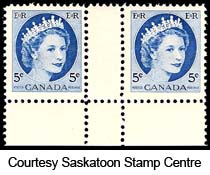
|
Elizabethan II Study Group Journal: The Corgi Times Glossary |
G | |||||||||||||||||||||||||||||
| G - overprint on stamps indicating Government (Official) use. These were discontinued as of 6PM on December 31, 1963. |
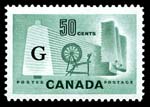 G overprint |
||||||||||||||||||||||||||||
| Gauge - a device used to measure the perforations around a stamp. The perf gauge is based on the number of
perforations found in exactly 2cm (centimetres).
A stamp that is perf 12.5 x 13.0 is a compound perforation: the top and bottom perforation is 12.5 (ie. 12.5 perforations in 2cm) and the left and right side perforation is 13.0. The method of perforating (ie. line vs. comb) is not a factor in determining the gauge. |

|
||||||||||||||||||||||||||||
|
General tagging -
phosphor
tagging
introduced in April 1972 in Ottawa, Ontario. It fluoresces a yellow-colour when exposed to ultraviolet light. Two major types exist: OP-4 and OP-2 (the former migrates, or spreads, throughout the stamp and will bleed onto and through other paper that is in prolonged contact with the tagging). See also Winnipeg tagging. |
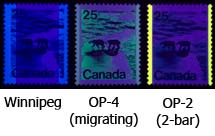 |
||||||||||||||||||||||||||||
| 'Ghost Town' - nickname given to 50c Street Scene stamp of 1978 with inscriptions omitted in error. |
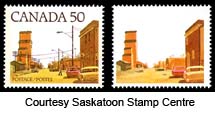 'Ghost Town' (right) |
||||||||||||||||||||||||||||
| Glassine envelope - translucent envelopes (in various sizes) for storing duplicate postage stamps. |
 Glassine envelopes |
||||||||||||||||||||||||||||
| Gravure - a form of stamp printing (see photogravure). | |||||||||||||||||||||||||||||
| Greetings stamps - name given to certain stamps by Canada Post that allowed the public to produce a personalized greeting by applying a suitable label (sticker) to the middle of the postage stamp. First issued in January 1994. Different styles have since been introduced. |
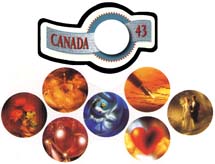 Greetings stamp and labels |
||||||||||||||||||||||||||||
| Guide dot/line - a dot (or line) placed on a plate to be engraved, or to which transfers are to be applied, to ensure the correct alignment of the next subject. Normally they are removed after the plate is finished |
 Guide dots |
||||||||||||||||||||||||||||
| Gum - the mucilage applied to the back of adhesive stamps, and has its basis crystalline gum arabic. Sometimes, the colour of the gum can be a determining factor in a new printing or variety.
Three types of gum have been used on the Elizabethan-era stamps in Canada: |
|
||||||||||||||||||||||||||||
| Gutter -
(1) a gap found between two adjacent stamps in a coil roll. Gutter strips are usually collected in strips of four stamps with the gutter in the middle. (2) the space between two adjacent panes of stamps. If the printing sheet of stamps are not cut into the post office panes properly, an inter-pane gutter may remain. |

| ||||||||||||||||||||||||||||
Gutter booklet - two different stamp designs
produced from the same printing sheet, cut in such a
way that either the full booklet pane or a portion
of the pane, appeared together separated by a
gutter. These were produced "on purpose" and sold by
Canada Post, including:
|
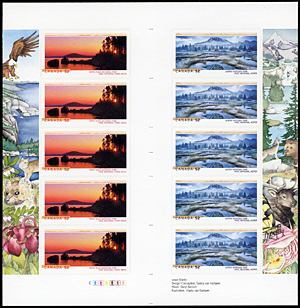 Gutter booklet |
||||||||||||||||||||||||||||
|
© 2001-2017, 2018 Website design by: Adminware Corporation. For information or questions regarding this website, please contact Robin Harris |

